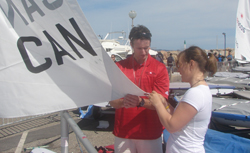|
Guthrie has consulted in the area of sports psychology since 1998, but became involved with Olympic level sport by working with the Canadian women’s Olympic sailing team in 2002. He helped prepare them psychologically for the Athens Games, and the team won a silver medal that year. After that, he was invited to become a sports psychologist with the Canadian Sport Federation.
Since then, he has helped various athletes of all ages from a variety of sports, including the women’s soccer team of his alma mater, Dalhousie University, where he earned his bachelor’s and master’s degrees in kinesiology. He worked with the soccer players in 2000, when they won the national championship.
“It’s always interested me how athletes make critical decisions in high-stress situations,” he said. “Psychological preparation before a big match helps control distraction and brings physical skills to the forefront, so that they can be executed without hesitation.”
Although he was already armed with a wealth of experience, Guthrie said the graduate program in kinesiology offered by Temple was too good to pass up.
“I was looking through a catalog of graduate programs, trying to decide where I wanted to go,” he said. “Michael Sachs [professor of kinesiology] happened to be the editor of that catalog, and the description he’d written for Temple’s kinesiology program really stuck out.”
A native of Canada, Guthrie said he was particularly interested in Temple’s emphasis on recruiting international students.
“It seemed that Temple was looking to recruit different types of students with different outlooks. It was definitely more progressive than other programs I saw,” he said.
Guthrie also credits Sachs for helping him combine his interest in sports psychology with disability sports; Guthrie will graduate with a certificate in disability studies from Temple’s Institute on Disabilities. He has already worked closely with the coach of the United States Paralympic Team, and this summer will work with their Canadian counterparts.
“Disabled athletes have a unique set of stressors,” Guthrie said. “They have to work hard to overcome prevailing attitudes about disabled people on top of the issues that other athletes face.”
Before training with the Canadian Paralympic Team this summer, Guthrie is traveling to France to help the Canadian men’s Olympic sailing team prepare for the Games in Beijing.
For all of his success already, Guthrie credits Temple for giving him a strong base for future endeavors.
“I got a great mix of experience and education — it was the best of both worlds. I couldn’t have asked for a better advisor [in Sachs], and I am totally, 100 percent happy with what I got while at Temple.”
|
